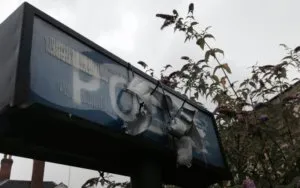Levels of disability hate crime in England and Wales have fallen in the years between 2007 and 2014, figures contained in a new report by the equality watchdog suggest.
The publication is the latest in a series of follow-up reports carried out by the Equality and Human Rights Commission (EHRC) in the wake of its major inquiry into disability-related harassment, which produced its findings in 2011.
That inquiry concluded that public bodies were guilty of a “systematic, institutional failure” to recognise disability hate crime.
The commission’s figures are likely to prove controversial, as many disabled campaigners have suggested that government and media rhetoric about “benefit scroungers” has fuelled an increase in disability hate crime.
But the figures could show instead that the impact of so-called “scrounger rhetoric” may have been outweighed by more positive factors that have led to lower levels of hate crime, while disablist political and media rhetoric dates back at least as far as 2007, when Labour work and pensions secretary Peter Hain vowed to “rip up sicknote Britain”.
The new figures suggest that although efforts by campaigners to raise awareness of disability hate crime have led to a sharp increase in the number of crimes reported to police, the overall level of disability hate crime may have fallen between 2007 and 2014.
Home Office figures show that the number of disability hate crimes recorded by police has risen every year since 2011-12, and increased from 2,006 in 2013-14 to 2,508 in 2014-15.
But figures in the new report – taken from the Crime Survey for England and Wales – describe the number of disability hate crimes actually experienced by disabled people.
One table in the report shows that the number of incidents of disability hate crime affecting adults in England and Wales fell from an average of 77,000 per year during the period 2007-08 to 2009-10 to an average of 56,000 per year during the period 2011-12 to 2013-14.
The commission did not mention this fall in disability hate crime in a press release issued alongside the report, which is likely to be due to concerns over the “statistical significance” of the figures.
But DNS has confirmed with EHRC statisticians that this fall is still reasonably statistically significant*, and therefore is likely to mean that there has been a genuine drop in disability hate crime.
Other figures in the report are even more statistically significant (more likely to be due to a real change in levels of crime rather than just chance).
A second table in the EHRC analysis shows that from 2007-08 to 2009-10, about 0.11 per cent of all adults in England and Wales were victims of a disability hate crime. This fell to 0.08 per cent in the period 2011-12 to 2013-14**.
The report also shows that the apparent drop in disability hate crimes relating to property – such as burglary and car crime – is more significant than for personal crimes, such as assault, where the evidence of any fall is much less clear.
Katharine Quarmby (pictured), a coordinator of the Disability Hate Crime Network and author of the ground-breaking book Scapegoat: Why We Are Failing Disabled People, which investigates disability hate crime, welcomed the report.
She said: “I welcome the continued focus of the Equality and Human Rights Commission on disability hate crime, and this report in particular.
“I think the statistics from the Crime Survey showing a (self-reported) small fall in disability hate crime are interesting. They are in line with a general small fall in hate crime across England and Wales.
“If the figures are correct, they may well bear testament to a number of policies finally bearing fruit: disabled people’s organisations campaigning for awareness of such crimes and for a ‘zero tolerance’ of hate crime, which is gaining traction in the wider population; the criminal justice system accepting that hate crime exists and that it is unacceptable; and, finally, British society turning its back to some extent on old attitudes of hatred and discrimination.
“This is not to say that the reports we are still receiving of disability hate crime (and of other hate crimes) are in any way to be disbelieved.
“We all know that the disability benefit rhetoric agenda has been toxic. But if the figures are true, then many British people are rising above it. This has to be a good thing.
“But while there are still disability hate crimes in Britain, and in the world, we still have work to do.”
An EHRC spokesman told Disability News Service yesterday (Wednesday): “We cannot say for certain but at the time that this report looked at, the total number of disability hate crimes may have dropped.
“If this is the case, it will be welcome news. All hate crime is abhorrent and even one case is one too many.”
*The commission points out in the report that this fall is not statistically significant at the level of 95 per cent confidence, but it has confirmed to DNS that it is statistically significant at the level of 89 per cent confidence. This means that EHRC can be 89 per cent certain that there was a real fall in disability hate crime rather than a drop showing up in the figures by chance
**This fall was statistically significant at the level of 95 per cent, so the commission was 95 per cent certain there was a genuine reduction in disability hate crime
Picture by Tom Green

 Ministers are considering further extension to disability hate crime laws, after pledge on ‘aggravated’ offences
Ministers are considering further extension to disability hate crime laws, after pledge on ‘aggravated’ offences Abuse of disabled supporters at live sports events is growing problem, survey finds
Abuse of disabled supporters at live sports events is growing problem, survey finds Call for hate crime law reform, as broadcaster says young people too sick to work are ‘parasites’
Call for hate crime law reform, as broadcaster says young people too sick to work are ‘parasites’